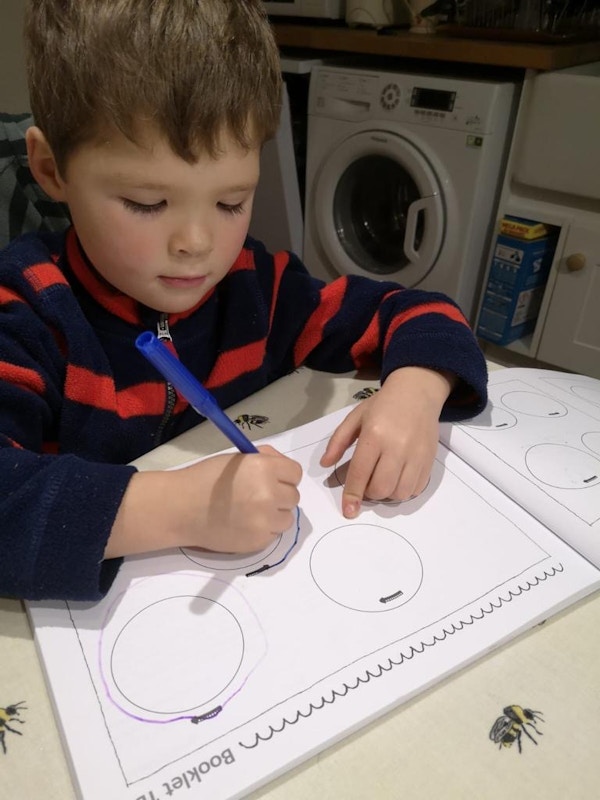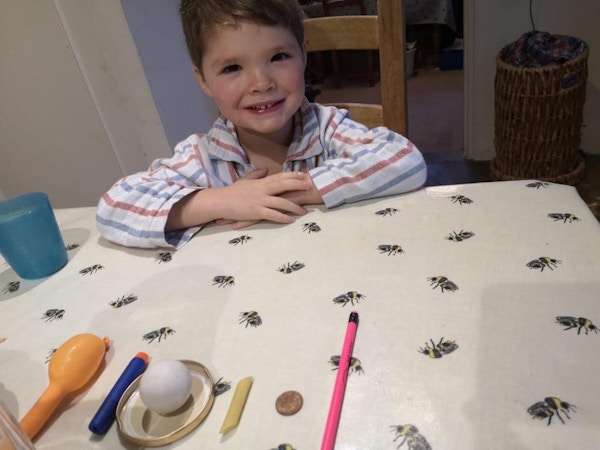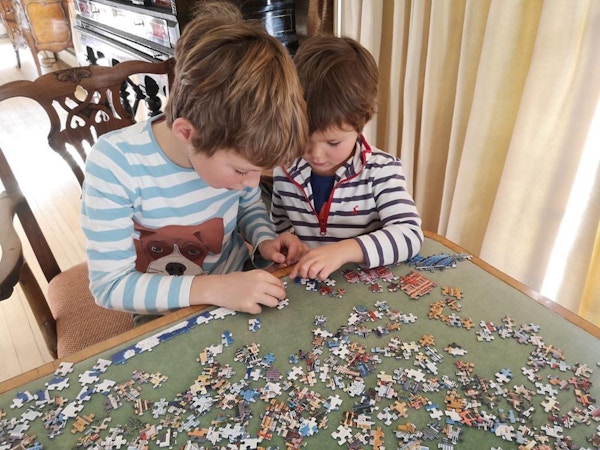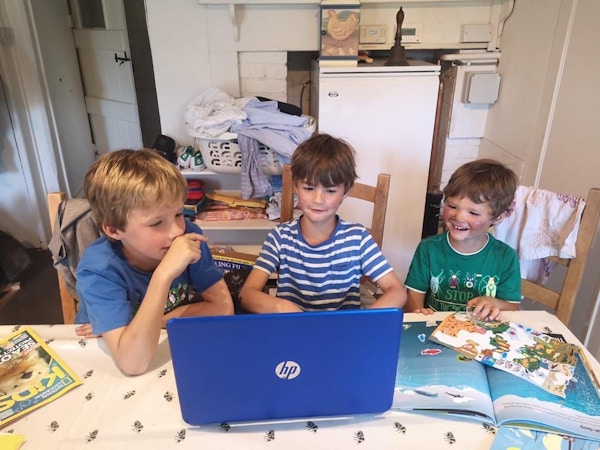Everybody is anxious and feeling daunted. Nobody was planning on this lockdown happening and parents are scouring online for ideas to best manage the time self-quarantined at home. Iona has plenty of tips for how to survive and thrive while in social isolation.
More important than any literacy or numeracy learning is your child’s wellbeing during these trying months. This should be the area to which you devote most of your thought, time and energy. Do bring the home-schooling in but don’t do it to the detriment of their mental health. A happy child is a child that will learn.
Educate With Iona runs maths and phonics workshops to help parents and carers support their child’s early education. Iona offers one-to-one Skype consultations to advise parents on home-schooling. If you want advice as to how to best home school, email Iona at admin@educatewithiona.com. She shares some of her top tips with us here.
Listen To Your School
Before you search online for educational resources, look at what your child’s school has given you. They know your child’s education best and will provide relevant resources. Following your own school’s guidelines, see how you can fit it into your own life. Remember, even if the school has provided digital instruction, this will need supervision.
Your Greatest Challenge
Probably the hardest thing with home schooling is the parents’ attitude. Try to keep your nerves intact and show a positive attitude towards home schooling. Now is the time to adopt your best Blue Peter presenter imitation. Start every day with a deep breath and tell your children how excited you are about this chance to home school. Say it’s an amazing opportunity and that you can’t wait to be a part of their educational journey. Spell it out to them. Say you feel so privileged to be allowed to do some teaching with them.For any of us as parents, we know how frustrating it can be when you sit beside a child starting to read or as they struggle to learn their times tables. You can feel your inner rage bubbling up as your child doesn’t grasp a seemingly simple concept. Your challenge is going to be to suppress showing any frustration. Take a deep breath and remember how hard they are finding it too.
Bite-Sized Learning
When you approach any bit of learning, start the activity or lesson with something easy that the children have already grasped. This way, you are building their confidence and they will be much more willing to give something else a go as it gets a bit harder. Say things like, ‘There’s no point me giving you things that you can do, let’s have a look at doing something a bit more challenging.’
Use Your Praise Wisely
When praising your children, be specific. For example, you could say, ‘I love the way you sounded that word out’ or, ‘with that calculation, I can see that it’s laid out correctly and that the strategy is completely correct. However, there was a slight error here. Let’s talk about it.’Keep Lessons Short And Sweet
Home schooling is very different to mainstream school. Remember a lesson at school is usually between 45 minutes to one hour. If you are giving a one-to-one session to your child, make your input much shorter because of its intensity. Their activity or research can be longer but when it is you sitting alongside the child trying to explain something, be aware of keeping it brief. Take one key point, especially with maths, and practise it. Don’t take on a massive area within a subject. Do it in small bite-size, manageable steps.What You Should Do Every Day
Some things should just be part of a non-negotiable routine. Things that are vital are reading and maths. All children need to read every day. Consider having a family reading time, which is a good model for your children to actually see their parents reading. This also will allow you some much needed downtime. Every day that you are home-schooling, you should have a 15-minute session of the appropriate level of maths. Whether it is number bonds to ten or times tables or division facts for older children. Fit in handwriting each day. While so much of their home school learning will be online, it’s vital that their handwriting doesn’t get forgotten. To practise handwriting, the child could choose a favourite poem and copy out two lines each day. It’s not about quantity, it’s about quality and frequent practise. Or, go back to snail mail. Your children could become pen pals and handwrite a letter to a school friend or isolated grandparents.Get Outside
Learn outside where it is possible. So long as you are not close to people, it is safe for you to be outdoors. Be creative. Look at the length of shadows for science, create a wildlife tally chart, or counting colours of cars passing and make them in a graph. Use the environment around us, both city and countryside.Don’t Overload
Try not to cram in too many subjects per day. Use this time as a chance to be child-led. Follow their passion and build a project around it. It may be space, history of Lego or the life cycles of butterflies. It can be anything. Take on interesting projects. For example, research an artist and create a power point or write a fact book on your favourite interest, or your family history with regards to who did what in the world wars.
Keep Hands Busy And Minds Occupied
Remember how much learning there can be in calm and quiet activities that will give you a break. Consider sewing for any age. Put on a story CD, buy a sewing hoop and get them to embroider their name onto their pillow-case. Sewing is incredibly good for fine motor skills. Or dig out a musical instrument and practise. Build time into the day for board games, chess or hard puzzles. Have a jigsaw permanently on the go. Download mindful colouring worksheets from Google. If you can keep their hands busy and their minds occupied, this will impact parent’s and children’s mental wellbeing.At The End Of Each Day
Be organised. This will be so hard when you are exhausted at the end of the day. Even if you are tired and fractious at the end of the day, spend 15 minutes preparing the next day’s timetable. It may be the last thing you feel like doing but you will sleep better knowing that everything is in place. Children are going to challenge your authority as their teacher. They are used to having a timetable for the school day and a similar approach at home will help to make these unexpected months more reassuring. If a timetable is out at breakfast and they know it is non-negotiable, that will help you all. Give your timetable a fixed starting time like 9am.
Children Deserve A Mental Break
Your children, who have just had a full stimulating and exhausting term, do need a holiday. They need a mental break and time to get bored which will help them be truly creative off their own backs. They are still children and they may be frightened. Nurture them.
Burn Off Steam
When you create their timetable, try to build in 45 minutes of exercise per day. This could be online aerobics, yoga, going for a bike ride or using a skipping rope. It doesn’t need to be outside, but the fresh air may help boost morale.Teach Life Skills
While schoolwork matters, this is an opportunity to teach age-appropriate life skills such as how to do laundry, cook food from scratch or clean the bathroom. Teach them how to be frugal and how to save money by menu planning to make food last as long as it can. Life is not all about books and numbers.Be Kind To Yourself
Look out for yourself. Do not enter this self-isolating home-schooling time with massive expectations. You are not going to be perfect, and that’s fine. Start with what you know and learn on the job. This is not the time to get overly competitive or ambitious for your children. Look at every day that they learn anything as a huge success for both them and you. Remember, you are not a trained teacher. This is going to be harder than you can picture but hopefully you will really enjoy it as well. Look at this as a precious time. Be positive and do what’s right for you.Educate With Iona runs maths and phonics workshops to help parents and carers support their child’s early education. Iona offers one-to-one Skype consultations to advise parents on home-schooling. If you want advice as to how to best home school, email Iona:
admin@educatewithiona.com
Like this? Read more
Helpful Online Information About Coronavirus
How To Clean Your Smartphone
7 Of The Best Kids’ Educational Apps
By Annabel Jack
March 2020


